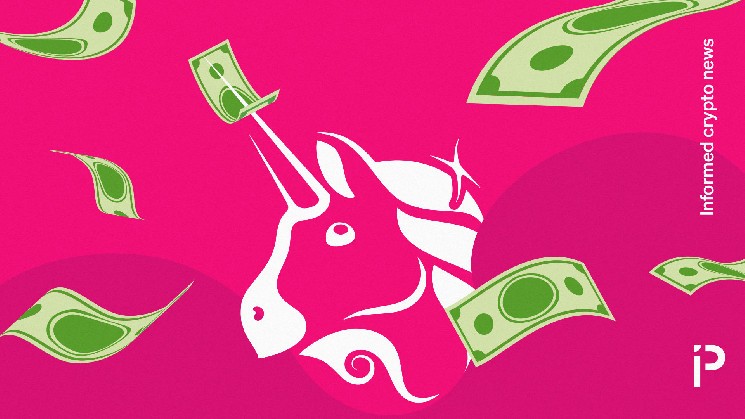How Uniswap’s voting system is unfairly favoring the richest token holders

Wealth equals power, especially when it comes to decentralized exchange (“DEX”) governance, and Uniswap serves as a prime example.
Unlike a “one person, one vote” democracy, Uniswap’s wealth-based vote weighting system allows the rich to consistently overpower the majority of users.
Due to this plutocratic system, a governance process that’s supposed to be decentralized has become overwhelmingly centralized, and many within Uniswap’s large user base have begun to voice their concern.
CoinMarketCap ranks Uniswap as the top DEX by volume. Over $1.3 billion worth of transactions have been made on the platform during the past 24 hours.
As opposed to a centralized exchange which requires account creation and Know Your Customer (KYC) checks, anyone can use Uniswap’s protocol to exchange tokens without permission.
Its website and front-end interface, however, is centrally managed and has delisted over 100 tokens during its history without any community vote.
Decentralization theatrics at Uniswap
Most people interact with Uniswap through the website interface. Therefore, the website’s administrator — Uniswap Labs, and its small board of executives — have unilaterally censored the experience of the vast majority of Uniswap users.
According to Uniswap documentation, anyone who holds its proprietary UNI token in a MetaMask wallet and goes through its delegation process can participate in Uniswap’s governance.
However, from a practical standpoint, the financial requirements restrict the majority of users from having any impact on the governance process. The weight of a vote depends on how much UNI the voter has delegated, as delegated tokens determine how many votes the delegate can cast on any given proposal.
For context, one estimate of the amount of UNI needed to actually implement a Uniswap change proposal places the value at around $22 million.
After considering the expenses of UNI staking and ETH fees, some people have questioned whether it’s worth making a proposal at all. As pointed out by one critic, Uniswap’s developers never implemented a fee switch proposal, even though it passed every round of Uniswap’s community voting process, including a consensus check with 100% votes in favor.
Some users countered that Uniswap could be better without implementing the fee switch proposal due to the risks of being classed as a security by the SEC. However, risks aside, the point of interest is that Uniswap’s governance process clearly does not function as advertised.
Resubmitting the proposal may not have helped either. Due to the plutocratic nature of Uniswap’s governance, a wealthy UNI token holder or organization could easily block any resubmission through Uniswap’s weighted voting.
Uniswap delegates are some of the wealthiest organizations in the industry. The a16z delegate, the largest of them all, represents 42 token holders, and has 15,000,039 votes with a total weight of 6.783%. The second largest wallet belongs to ConsenSys, and holds 7,032,461 votes with a vote weight of 3.18%.
Uniswap is on-chain governance so there’s nothing stopping someone from making a gov proposal if they want to?
— zuberg (@0xzuberg) August 15, 2022
Just have $22 million, and you won’t be too poor to effect change at Uniswap.
However, this skewed token distribution is not stopping users from trying, and one developer has found a way to submit “autonomous proposals”, therefore bypassing the need to own vast amounts of UNI to create an official vote.
I deployed an autonomous proposal to enable the 10% @Uniswap protocol fee switch for:
– DAI-ETH-0.05%
– ETH-USDT-0.3%
– USDC-ETH-1%Params: feeProtocol0 == 10, feeProtocol1 == 0
Deploy:https://t.co/fvS1ZE6P1T
Autonomous Proposal: https://t.co/VvBPuAzvk7
— Anish Agnihotri (@_anishagnihotri) August 15, 2022
Anish Agnihotri, self-described “serial hacker causing chaos.”
Read more: This Uniswap airdrop promised $2K — instead it stole $8M
Agnihotri’s autonomous proposal aims to enable the controversial “fee switch” which was previously denied by Uniswap. His proposal suggests a 10% protocol fee switch for the following liquidity pools.
- DAI-ETH – 0.05%
- ETH-USDT – 0.3%
- USDC-ETH – 1%
The outcome of the vote is yet to be seen, and although Agnihotri has found a way to autonomously create the proposal, the outcome would still be decided by those who hold the most tokens.
It seems that decentralization, as the SEC has repeatedly reminded, is often in name only.
For more informed news, follow us on Twitter and Google News or listen to our investigative podcast Innovated: Blockchain City.






 Bitcoin
Bitcoin  Ethereum
Ethereum  Tether
Tether  USDC
USDC  TRON
TRON  Dogecoin
Dogecoin  Cardano
Cardano  Bitcoin Cash
Bitcoin Cash  Chainlink
Chainlink  Monero
Monero  LEO Token
LEO Token  Zcash
Zcash  Stellar
Stellar  Litecoin
Litecoin  Hedera
Hedera  Dai
Dai  Cronos
Cronos  Tether Gold
Tether Gold  OKB
OKB  Ethereum Classic
Ethereum Classic  KuCoin
KuCoin  Gate
Gate  Algorand
Algorand  Cosmos Hub
Cosmos Hub  VeChain
VeChain  TrueUSD
TrueUSD  Dash
Dash  Tezos
Tezos  Stacks
Stacks  IOTA
IOTA  Basic Attention
Basic Attention  Theta Network
Theta Network  Decred
Decred  NEO
NEO  Synthetix
Synthetix  Qtum
Qtum  Ravencoin
Ravencoin  0x Protocol
0x Protocol  DigiByte
DigiByte  Nano
Nano  Zilliqa
Zilliqa  Siacoin
Siacoin  Numeraire
Numeraire  Waves
Waves  Status
Status  BUSD
BUSD  Pax Dollar
Pax Dollar  Enjin Coin
Enjin Coin  Ontology
Ontology  Hive
Hive  Lisk
Lisk  Steem
Steem  Huobi
Huobi  OMG Network
OMG Network  NEM
NEM  Bitcoin Gold
Bitcoin Gold  Augur
Augur  Ren
Ren  HUSD
HUSD